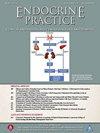Recent Trends in Diabetic and Nondiabetic Neuropathies: A Retrospective Hospital-based Nationwide Cohort Study
IF 3.7
3区 医学
Q2 ENDOCRINOLOGY & METABOLISM
引用次数: 0
Abstract
Objective
The aim of this study was to evaluate the trends in the incidence of diabetic neuropathy (DN) and nondiabetic neuropathy (non-DN) in a hospital-based cohort between 2010 and 2019 in Romania.
Methods
We retrospectively analyzed cases with a primary or secondary discharge International Classification of Diseases, Tenth Revision, diagnosis code of neuropathy reported throughout Romania.
Results
A total of 1 725 729 hospitalizations with a diagnosis of neuropathy (DN, 769 324 - 44.6%, and non-DN, 956 405- 55.4%) were identified. Women accounted for more DN cases (40 0 936- 52.1%), and men accounted for more non-DN cases (63 7 968- 61.0%). The incidence rate showed an increasing trend during the index period, by a mean rate of 4.3%/year for non-DN and 1.4%/year for DN. Type 2 diabetes was responsible for the overall increase in the incidence rate of DN, whereas in type 1 diabetes, the incidence rate decreased; in both types of diabetes, diabetic polyneuropathy was predominant, whereas autonomic neuropathy had an incidence rate of 10 to 20 times lower than polyneuropathy. The incidence rates of non-DNs increased mainly due to inflammatory polyneuropathies (+3.8%) and uremic neuropathy (+10.3%).
Conclusion
Using a nationally representative database of hospital-admitted cases, we found that the incidence rates of DN and non-DN increased from 2010 to 2019. The main contributors were type 2 diabetes, inflammatory polyneuropathy, and uremic neuropathy.
糖尿病和非糖尿病神经病变的最新趋势:一项以医院为基础的全国性回顾性队列研究。
研究目的本研究旨在评估2010年至2019年间罗马尼亚医院队列中糖尿病和非糖尿病神经病变的趋势:我们回顾性分析了罗马尼亚各地报告的主要或次要出院 ICD-10 诊断代码为神经病变的病例:结果:共发现 1,725,729 例诊断为神经病变的住院病例(44.6% 为糖尿病神经病变,55.4% 为非糖尿病神经病变)。女性占糖尿病神经病变病例的52.1%,男性占非糖尿病神经病变病例的61.0%。在指数期间,发病率呈上升趋势,非糖尿病神经病变的平均发病率为 4.3%/年,糖尿病神经病变的平均发病率为 1.4%/年。2 型糖尿病是导致糖尿病神经病变总体增加的原因,而 1 型糖尿病的发病率则有所下降;在这两种类型的糖尿病中,糖尿病多发性神经病变占主导地位,而自主神经病变的发病率则比多发性神经病变低 10 到 20 倍。非糖尿病神经病变增加的主要原因是炎症性多发性神经病变(+3.8%)和尿毒症神经病变(+10.3%):通过使用具有全国代表性的入院病例数据库,我们发现糖尿病和非糖尿病神经病变在2010年至2019年期间有所增加。2型糖尿病、炎症性神经病变和尿毒症性神经病变是主要原因。
本文章由计算机程序翻译,如有差异,请以英文原文为准。
求助全文
约1分钟内获得全文
求助全文
来源期刊

Endocrine Practice
ENDOCRINOLOGY & METABOLISM-
CiteScore
7.60
自引率
2.40%
发文量
546
审稿时长
41 days
期刊介绍:
Endocrine Practice (ISSN: 1530-891X), a peer-reviewed journal published twelve times a year, is the official journal of the American Association of Clinical Endocrinologists (AACE). The primary mission of Endocrine Practice is to enhance the health care of patients with endocrine diseases through continuing education of practicing endocrinologists.
 求助内容:
求助内容: 应助结果提醒方式:
应助结果提醒方式:


